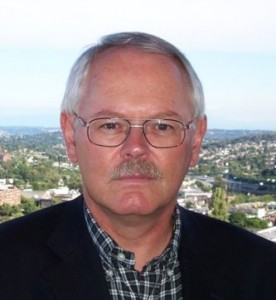More than a half-century ago, Flannery O’Connor wrote a short story, “A Good Man is Hard to Find.” One of the main characters in the story is an elderly woman who is a difficult, stubborn and not a particularly happy person. Traveling to Florida with her family, she is constantly whining and complaining. Then, thanks to some carelessness on her part, they get in a traffic accident and while their car is stalled, an escaped convict (the Misfit) chances on them and executes the whole family. Just before she is shot, the unhappy elderly woman, fearing for her life, reaches out and touches the Misfit and has a gentle moment with him. After killing her, he says, “She would have been a good woman, if there had been somebody there to shoot her every minute of her life.”
I suspect we would all be better persons if there were someone there to shoot us every minute of our lives. At least I know that I would because I once had someone there to shoot me and it made me a better person, at least during the time when the threat was there. Here’s my story.
Twelve years ago, I was diagnosed with cancer. The initial prognosis was good (surgery and chemotherapy, and the cancer should be stopped). For a while, it was. However, three years later, it again made an unwelcome reappearance. This time the prognosis was not good. My oncologist, whom I trust, shared that situation was grave. Chemotherapy would be tried again but, he assured me, barring the exceptional, this treatment would not be effective for long and would be more for palliative purposes than for any real hope of remission or cure. He felt it his duty to deliver that message clearly. I was facing the shooter. You have about 30 months to live!
As you can guess, this wasn’t easy to accept and process. I struggled mightily to make peace with it. Eventually, through prayer, I wrote a creed for myself as to how I would try to live out those two years. Here’s the creed:
I am going to strive to be as healthy as I can for as long as I can.
I am going to strive to be as productive for as long as I can.
I am going to make every day and every activity as precious and enjoyable as possible.
I am going to strive to be as gracious, warm, and charitable as possible.
I am going to strive to accept others’ love in a deeper way than I have up to now.
I am going to strive to live a more fully “reconciled” life. No room for past hurts anymore.
I am going to strive to keep my sense of humor intact.
I am going to strive to be as courageous and brave as I can.
I am going to strive, always, to never look on what I am losing, but rather to look at how wonderful and full my life has been and is.
And, I am going to, daily, lay all of this at God’s feet through prayer.
For some months, I prayed that creed intensely every day, trying to live out its every tenet. However, the chemotherapy treatments were, surprisingly, very effective. After five months of treatment, all the indications of cancer were gone, I was healthy again, and my oncologist was optimistic that, perhaps, his diagnosis had been too dire and that with some maintenance chemo, I might enjoy many more years of life. And, indeed I did for the next seven years.
However, during those seven years of remission, feeling healthy and optimistic, with no one there to shoot me every day, I now prayed my creed less frequently and with less intensity. And even though its challenges were now more ingrained in me, my old habits of taking life for granted, of praying St. Augustine’s prayer (Make me a better Christian, Lord, but not yet!), of losing perspective, of impatience, of self-pity, of nursing grievances, and of not appreciating fully the richness of life, began to seep back into my life.
The “shooter” reappeared two years ago with another reoccurrence of the cancer. Initially the prognosis was dire (30 months and chemotherapy for the rest of my life) and the creed again took a central place in my life. However, a new treatment unexpectedly offered a much longer future and, with no one there to shoot me every day, the creed again began to lose its power and my old habits of impatience, ingratitude and self-pity began again to mark my days.
I am deeply grateful for all the post-cancer years that God and modern medicine have given me. Cancer has been a gift that has taught me a lot. Having my life parceled out in six-month chunks has me appreciating life, others, health, nature, the simple joys of life and my work like never before. I’m a better person when there is someone there to shoot me every day!
Oblate Fr. Ron Rolheiser is a theologian, teacher and award-winning author. He can be contacted at www.ronrolheiser.com.

Oblate Fr. Ron Rolheiser
